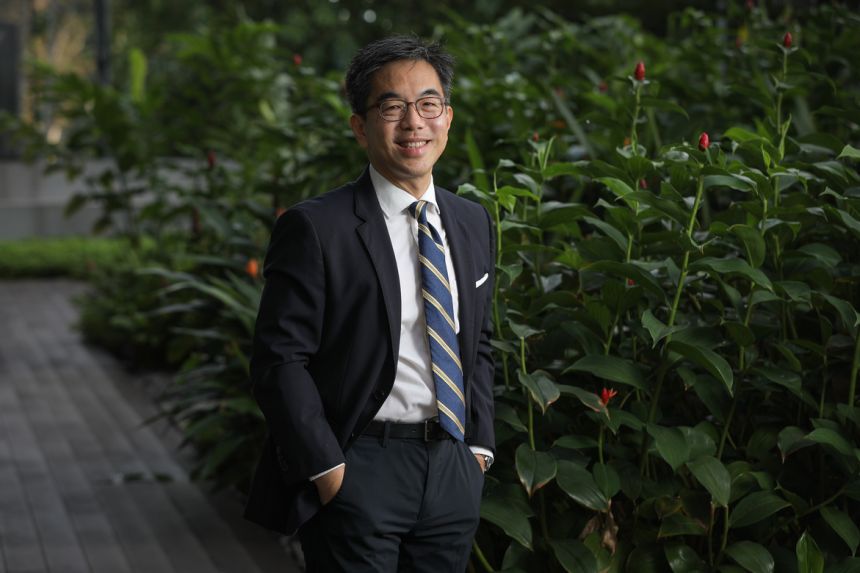
Professor Wong Tien Yin will become the founding head of new healthcare and medical sciences academy Tsinghua Medicine.ST PHOTO: ONG WEE JIN
SINGAPORE - One of Singapore's trailblazing clinician scientists, Professor Wong Tien Yin, who is medical director of the Singapore National Eye Centre (SNEC), is forging a new path in Beijing, China, early next year.
Taking the road less travelled, as he is wont to do, he will become the founding head of Tsinghua Medicine, a new healthcare and medical sciences academy at Tsinghua University.
Prof Wong, 53, who is also SingHealth's deputy group chief executive for research and education as well as vice-dean of the office of academic and clinical development at Duke-NUS Medical School, hopes to inject a bit of Singapore know-how into China to help Tsinghua develop its own academic healthcare system.
"We have built a road map and model for academic medicine at the SingHealth Duke-NUS Academic Medical Centre (AMC), and it is time to share some of the lessons and see if ours can be a model for a much larger population in a new culture and environment," he said.
This involves developing clinician scientists, preparing medical students for future healthcare problems like ageing and for new healthcare technologies, and more.
The perception in Singapore of a clinician scientist has changed greatly since the 1990s, when "you were either a scientist or a doctor", he said.
Prof Wong knows first-hand how tough it was to pursue both science and medicine then - it was an uncertain route as research was not part of hospitals' agenda.
The former President's Scholar had failed to get a scholarship to do his PhD at Johns Hopkins University in the United States. He was told: "You're already a doctor, why do you need a PhD?"
Prof Wong has gone on to publish countless peer-reviewed papers in prestigious medical journals like The Lancet and Nature.
A two-time recipient of the Singapore Translational Researcher Investigator Award, he has also bagged other honours, including the National Outstanding Clinician Scientist and President's Science awards.
His research has improved the world's understanding of the prevalence and risk factors of major eye diseases such as diabetic retinopathy and age-related macular degeneration. He has devised screening and disease prevention strategies using telemedicine and innovative imaging.
For his work and leadership in developing clinician scientists, he was elected to the US National Academy of Medicine last year - a notable feather in the cap that he credited to support from the AMC.
In Singapore, the National University Health System is the other academic healthcare system.
Prof Wong said the move to Tsinghua - one of the top universities in China - will allow him to be directly involved in understanding the healthcare problems that China and Asia face, and helping to find solutions, as these issues are also highly relevant to Singapore.
The two countries, for instance, are grappling with an ageing population and a declining birth rate.
"With a smaller workforce, how do (you) improve the healthcare system to meet the challenges of an ageing population?" he said.
The new role offers "exciting opportunities" to build links and collaborations between Tsinghua and SingHealth Duke-NUS AMC and other Singapore entities, such as the Agency for Science, Technology and Research, he added.
Tsinghua contacted him early this year when it was on a global talent hunt. When Prof Wong learnt that the role is "going to be challenging and not straightforward", his interest was piqued.
He consulted various people, including SingHealth leadership and those in the public sector.
His wife Ng Hsueh Mei, a family physician at a SingHealth polyclinic, will accompany him to China. Their two sons are now in university in Britain.
It was certainly not an easy decision and, conversely, it is very easy for senior doctors to continue doing what they are doing here, he said.
His impending move to China has drawn tributes from his superiors here.
SingHealth group chief executive Ivy Ng said in a media release that Prof Wong has been "trailblazing many important research and education initiatives and nurturing a strong academic medicine culture" at the AMC.
Professor Thomas Coffman, dean of Duke-NUS Medical School, describes him as a "visionary clinician scientist who has been a champion of academic medicine and an inspiring role model" at the AMC.
But Prof Wong is not cutting off all links to Singapore. He will be SingHealth's senior adviser from Jan 1.
At SNEC, Professor Aung Tin will be medical director, while Professor Lim Soon Thye will be SingHealth's deputy group CEO for research and education.
Clinical Associate Professor Chow Wan Cheng will take over Prof Wong's Duke-NUS role.













 Get it on Google Play
Get it on Google Play